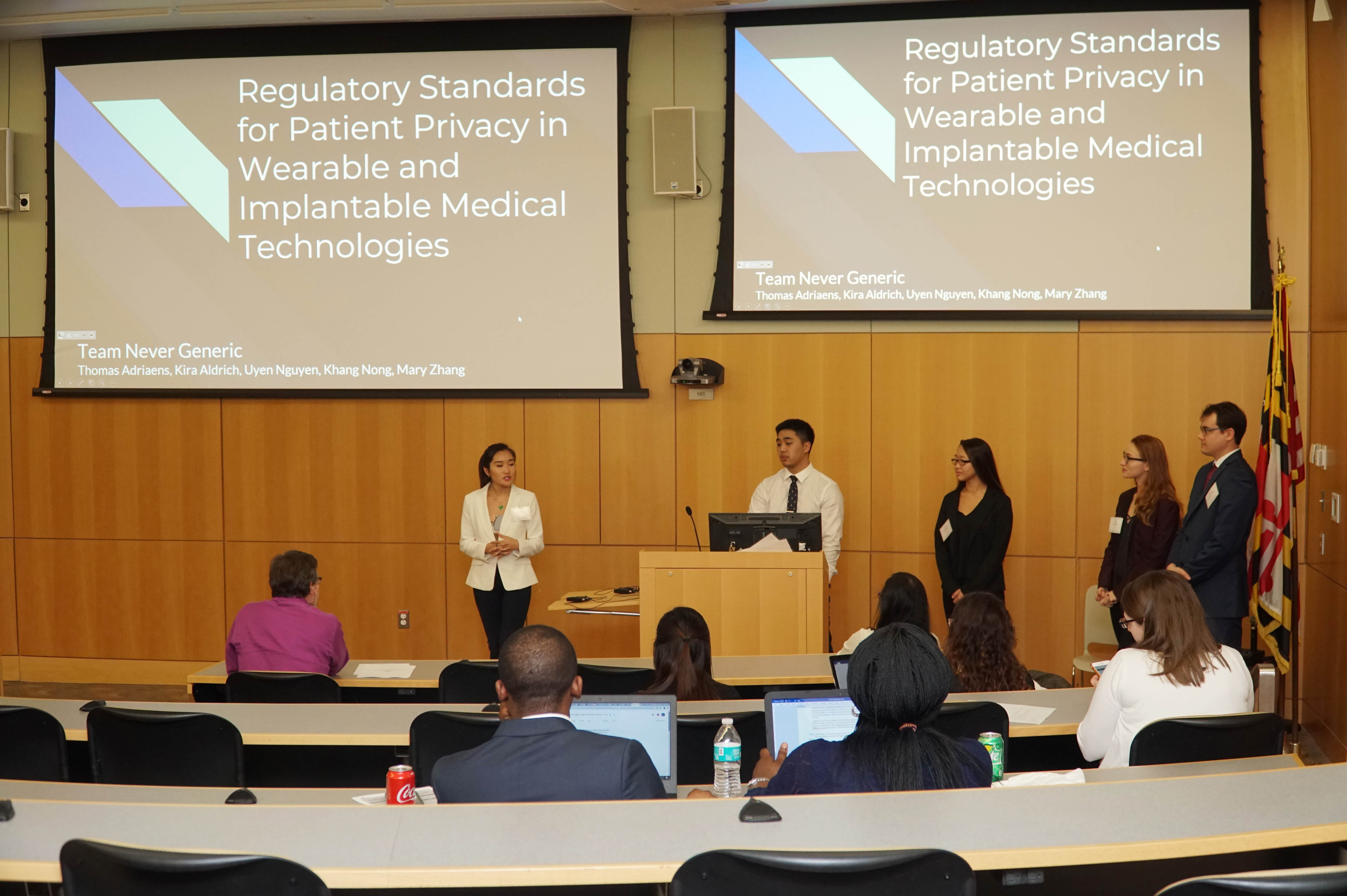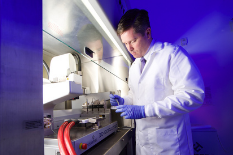News Story
M-CERSI Cooperative Agreement Grant Renewed by Food and Drug Administration
The University of Maryland Center of Excellence in Regulatory Science and Innovation (M-CERSI) has been renewed for funding under a cooperative agreement grant from the U.S. Food and Drug Administration (FDA). A collaborative partnership led by James Polli, PhD, the Shangraw/Noxell Endowed Chair in Industrial Pharmacy and Pharmaceutics at the University of Maryland School of Pharmacy, and William E. Bentley, PhD, the Robert E. Fischell Distinguished Chair of Engineering at the University of Maryland, College Park (UMCP), M-CERSI is one of only four FDA-funded CERSIs in the U.S., and the only CERSI to receive continuous funding from the FDA since it first launched in 2011. This latest renewal, which allows for up to $5 million per year over five years, will allow M-CERSI to continue its mission to contribute to modernizing and improving the ways in which drugs and medical devices are reviewed and evaluated.
“Partnering with the University of Maryland, College Park, and the FDA to launch M-CERSI has been very much like conducting an experiment,” says Polli. “We knew there was a need to help modernize the field of regulatory science, but we had to determine how each university might best leverage its unique expertise and work with the FDA to address that need. Seven years later, the results of our experimentation have exceeded, and continue to surpass, everyone’s expectations.”
M-CERSI brings together researchers from across the University of Maryland, Baltimore (UMB) and UMCP to focus on priorities outlined by the FDA, including improving preclinical assessments of the safety and efficacy of new drugs and devices; ensuring readiness to evaluate innovative and emerging technologies; harnessing diverse data through information sciences to improve health outcomes; and addressing minority health and health disparities. It also serves as an open forum to promote regulatory science exchange.
“One area in which M-CERSI has experienced unparalleled success has been in increasing the scientific exposure of researchers at the FDA,” says Polli. “The conferences, workshops, and lectures sponsored by M-CERSI since its launch have been crucial in helping those researchers learn more about the work being conducted by other scientists across academia and industry, as well as better understand how new scientific practices have been adopted by researchers across the country.”
Since its launch, M-CERSI has sponsored more than 40 conferences and workshops on topics related to its priority areas. These events are attended by experts from across academia, regulatory agencies, and the pharmaceutical industry, who share the latest developments in a number of scientific fields, such as big data, medical device evaluation, and patient-centric drug development. One conference, which highlighted the use of biomarkers in drug development, drew an audience of more than 500 researchers and featured a keynote address by Janet Woodcock, MD, director of the Center for Drug Evaluation and Research at the FDA.
Researchers from UMB and UMCP have also collaborated with the FDA on a number of projects aimed at supporting the development of new tools, standards, and approaches to assess the safety, efficacy, quality, and performance of FDA-regulated products. Yan Shu, PhD, associate professor in the Department of Pharmaceutical Sciences (PSC) at the School of Pharmacy, conducted several studies through a partnership with M-CERSI to examine the relationship between human organic cation transporter 2 (OCT2) and multidrug and toxin extrusion proteins (MATEs), which resulted in a significant update to the FDA’s guidance for in vitro metabolism and transporter-mediated drug-drug interaction studies in 2017. Polli also collaborated with faculty from the University of Maryland School of Medicine and researchers at the FDA on a project involving the synthesis and use of a novel trifluorinated bile acid analog, which led to a patent for compositions and methods to evaluate hepatobiliary/gastrointestinal health, enterohepatic circulation (circulation of substances from the liver to the bile), and drug interactions.
“Traditionally, there has been a gap between academic and industry interests, and regulatory requirements,” says Polli. “Through the collaborations that it has fostered between our researchers and researchers at the FDA, M-CERSI has been pivotal in helping us begin to bridge this gap. This partnership has truly proven to be a natural fit for both of our universities and the FDA.”
M-CERSI also inspired the School of Pharmacy to expand its academic footprint in the field of regulatory science. In 2013, the School established its online Master of Science and Graduate Certificate in Regulatory Science programs. Although not funded through M-CERSI, these programs strive to provide students with the knowledge and skills necessary to contribute to drug and biologics regulation and pharmaceutical product lifecycles. The School also hosts an annual “America’s Got Regulatory Science Talent” Competition during which students across UMB and UMCP are invited to present a potential solution to a current regulatory science challenge to a panel of judges from the School of Pharmacy and FDA. Past competition winners have presented ideas ranging from the development of a new testing system to detect counterfeit drugs to the creation of a new warning system for hazardous drugs.
The renewed grant award from the FDA will not only help M-CERSI continue to advance its mission, but also allow Polli and Bentley to continue to grow the partnership and create new opportunities for faculty from both UMB and UMCP to collaborate with the FDA on projects that span the spectrum of drug, biologics, and devices.
“The FDA is delighted to renew the M-CERSI cooperative agreement grant for five more years, reaffirming our commitment to support important collaborative regulatory science research projects that address our emerging needs and priorities,” says Carol D. Linden, PhD, director of the Office of Regulatory Science and Innovation at the FDA. “Since its inception in 2011, M-CERSI has provided valuable contributions to the FDA’s scientific understanding of a wide range of medical product-related issues. We look forward to continuing these vital collaborations.”
Published October 5, 2018





